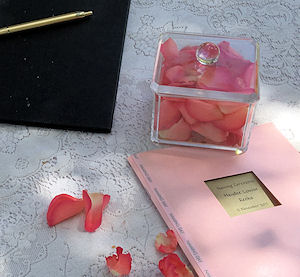Your Easy-As Guide to
Organising a Naming Ceremony
 Naming ceremonies are a popular
choice for families who want to celebrate their
child and formally welcome them into the family
without making a commitment to any particular
religion, and celebrate their gift to the child of a good name.
Naming ceremonies are a popular
choice for families who want to celebrate their
child and formally welcome them into the family
without making a commitment to any particular
religion, and celebrate their gift to the child of a good name.Like any celebration, working your way through a series of questions will help focus your minds on what you want for and from the occasion, and will also point you to what you need to do to make sure that you pull off an experience that your friends and loved ones will talk about for years.
Why do you want to have a
naming ceremony?
Where do you want to hold
the ceremony?
Holding the ceremony in your own backyard has distinct advantages.
- It is a familiar space for your child
- It is private
- You won't be competing with others for the space
- You can take your time setting up and clearing up
- You have no time limitations
However, with COVID-19 restrictions a ceremony at
home may also have externally imposed limitations
on who may attend, how many people in total, or
other requirements. And these are subject to
change.
If you plan to hold the ceremony in a public park
or other public space there are additional
considerations and things to be done
- How accessible is the space? Will parents with
small children in prams and anyone with mobility
problems be able to get to it easily? How far
away is the parking?
- What facilities are available and how close
are they? With a guest list that potentially
includes children, pregnant ladies, and older
people a long hike to the toilet is not an
attractive proposition. Are there any shelters?
Is there seating? What will you need to bring
with you?
- How crowded is the area likely to be? And how
noisy?
- Are there hazards in the vicinity - for
example unfenced ponds or water features
- Do you need a permit?
- Are you allowed to decorate the space?
Wherever you hold the ceremony it is a good idea
to carefully consider the space so that you can
decide, well ahead of the day, exactly where
everyone participating will stand and where the
guests will be. Things you need to check include:
- Shade - it is never a good idea to be in full sun
- Line of sight - will everyone be able to see what's going on, and will you (and your celebrant) be able to see the guests?
- Where you will position the table - you'll need a table to sign certificates and to hold any ceremonial or ritual objects
Don't forget Plan B
- It rains
- It is extremely hot
- The venue becomes unavailable (which can happen with parks and commercial premises
- A change to COVID-19 restrictions means you
can no longer use your Plan A site
Who will lead the
ceremony?
I offer two alternatives
- I will both create and lead the ceremony - which involves gathering detailed information about your child, your family, your wishes, and your hopes for your child, making suggestions about what to include in the ceremony, including rituals, creating personalised certificates, and leading the ceremony on the day
- A DIY ceremony where I create the ceremony for you and provide you with hints and tips about the practicalities of performing it but you either lead it yourselves or have a friend or family member lead it.
Either of those is a much better option that finding a boilerplate ceremony on the internet and swapping out the names!
How will you integrate
meaningful symbolism into the occasion?
- How will you link this occasion with earlier ceremonies? Your own wedding? Naming ceremonies or baptism of earlier generations, including yourselves, or, if you have an older child, their naming ceremony.
- Are there any family traditions that would be meaningful to include or refer to?
- Are there cultural traditions from either side of the family that could be incorporated? Honouring cultural background is a wonderful reminder your child's roots and the history of your family
What props or decorations
will you need?
Who would you like to
participate in the ceremony?
- Are you going to appoint godparents (adult sponsors and mentors who are usually still referred to as godparents in Australia but who can be called anything you like)? Hint: I suggest you don't call them guardians unless you have put legal steps in place appointing them as such in case the unthinkable happens.Appointing someone as a guardian as part of a naming ceremony has, in itself, not legal effect.
- Do you have an older child or children who could play a meaningful role in the ceremony?
- What about grandparents?
Participation of others doesn't need to add to
the length of the ceremony if it is carefully
thought out.
How will you include
anyone who is unable to be physically present?
Further Information
Thanks for reading!
